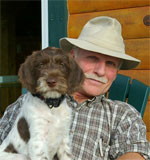 Duck season opened this
morning. I took the two dogs, even though there is no sane reason to have two
dogs. We toted our gear over to a tiny pond on a peninsula that juts out into a
salt pond and tossed out a couple of decoys. Then I improvised a blind in the
reeds and made myself comfortable.
Duck season opened this
morning. I took the two dogs, even though there is no sane reason to have two
dogs. We toted our gear over to a tiny pond on a peninsula that juts out into a
salt pond and tossed out a couple of decoys. Then I improvised a blind in the
reeds and made myself comfortable.
The ocean beyond the
salt pond and barrier beach roared. As I sipped coffee, the waves seemed loud
enough to be headed my way, and I wondered about the likelihood of a tsunami. A
cynical person might have thought the ocean sounded like a freeway, but I
decided that cars on a freeway sounded sort of like the ocean.
At four minutes to
gunning time I looked at my watch. Birds chirped all around us and ducks and
geese made a racket far from sight. The rumble
of the waves against the beach let up and then grew louder again. Three crows
flying to the east cawed about something and then disappeared. I poured more
coffee. Something in the weeds to our left repeated a low chirping sound over
and over, causing the dogs to growl. I
looked at my watch, and it was still four minutes to gunning time.
Two minutes after legal
shooting time passed I realized it was time to pay attention. We waited. The
younger dog, Colby, kept moving about, sitting and then standing, and then
lying down until she stood again.
 Two mallards fell out
of the sky and landed so close on the other side of the weeds that I couldn’t
see them. Colby bolted through the growth like a rocket and the ducks took off
low over the water, as if knowing that I’d hardly be able to see them. I never
fired a shot, but Colby was a tempting target for a moment.
Two mallards fell out
of the sky and landed so close on the other side of the weeds that I couldn’t
see them. Colby bolted through the growth like a rocket and the ducks took off
low over the water, as if knowing that I’d hardly be able to see them. I never
fired a shot, but Colby was a tempting target for a moment.
We listened to those
geese, nervous and sounding about to take off. They were behind us somewhere
out on the pond, but we never did see them. I looked at the way the morning
light filtered around the edges of the weeds, creating a white fuzzy line
around the shapes. A faint breeze tickled my left cheek, but barely moved the
dried grasses in front of me. The ocean seemed to growl less as the sun painted
pink streaks across the clouds.
Colby was into it by
then, and sat like a statue. Chara, the older German wirehair, had this duck
hunting stuff down pat, and sat patiently. Both of them waited and
trembled, eyes to the sky.
Two mallards came in
downwind from my left and made a wide circle, then dropped down over the
decoys. I stood to shoot and the birds flared. It looked further than I liked,
but I pulled the right trigger, immediately wishing I’d pulled the left and the
tighter barrel. Wings flapped furiously and the ducks never missed a beat. I am
sure I shot under the one that I had picked.
Cursing at myself, I
relocated my stool and the dogs closer to the edge of the weeds and the
decoys. My watch said the sun was up,
but the gray clouds hid it. It was going to be a bluebird day, so maybe the
gunning was already over. To the east ducks clattered periodically, but the
geese behind us were silent. I wondered where the pink streaks in the sky had
gone. The dogs sat like quaking statues.
I decided to hunt until
an hour after the season had started, which gave us fourteen more minutes,
after all, it was a work day. More crows flew across the sky, The sky changed
from shades of gray to dull muted purples, and then three puddle ducks,
probably mallards, lifted into the sky far away and traced the southern horizon, never
coming in our direction.
I poured more coffee.
That didn’t work, no ducks came. I dug out my camera and snapped a few
pictures. Still no ducks. I figured that with a camera in my hand the ducks
would storm in. Was I going to have to get up to pee to make ducks come?
Two male mallards came
in, rocketing downwind and from the left, passing directly overhead, and then
they made a wide circle in front of us, dark shapes against the sky. As they came around to pass straight
over my head again, I stood to shoot.
I should have shot the second
bird before he got to me, rather than trying to shoot straight up at the first
duck. I almost fell over backwards into the mud, and the ducks flew safely
away.
An hour into the first
day of the season, as the sky turned bright blue and the sun changed the
grasses to shades of aged bronze, I gathered up the decoys.
We would try it again
the next day.





